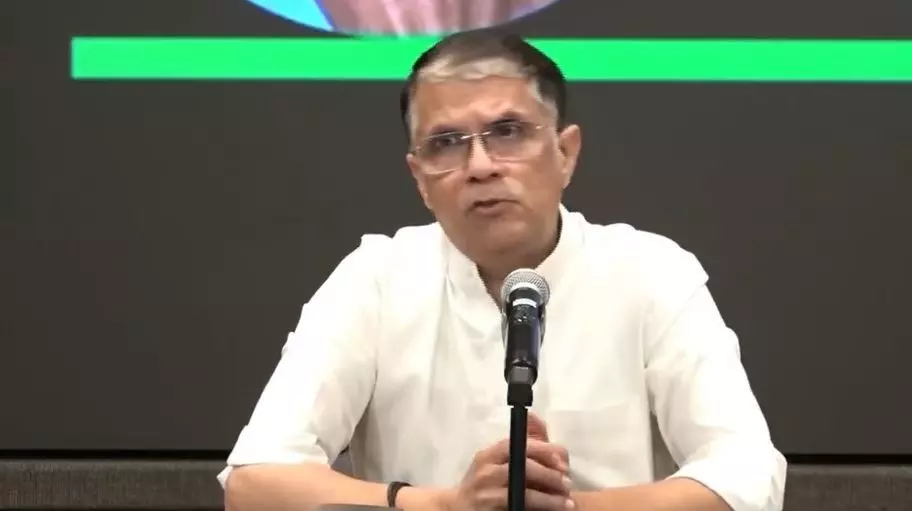
Congress slams NCERT partition module, says 'set book on fire'; BJP hits back
Pawan Khera claimed important historical dates were omitted from the book, which held the Congress responsible for partition, along with Muhammad Ali Jinnah and Lord Mountbatten

The National Council of Educational Research and Training (NCERT) on Saturday (August 16) faced the Congress’s ire after releasing a special module to remember the “Partition Horrors Remembrance Day”, which held, besides the Opposition party, former Muslim League leader Muhammad Ali Jinnah, and British Viceroy Lord Mountbatten, responsible for the country’s partition in 1947.
The ruling Bharatiya Janata Party (BJP) also hit back at the Congress, triggering a full-blown war of words.
The 'Partition Horrors Remembrance Day' is observed on August 14 every year since 2021 to remember the victims and sufferings of people during the partition.
Also read: Kerala governor’s circular on ‘Partition Horrors Day’ triggers fresh rift with govt
At a press conference in New Delhi, senior Congress leader Pawan Khera lashed out at the council over its new module, saying it overlooked important facts and presented a concocted history. He also called the Rashtriya Swayamsevak Sangh (RSS), the ideological mentor of the BJP, the biggest villain in the country's history.
Khera gives historical account
“Is 1938 mentioned or not (in the NCERT module)?” Khera, who is the chairman of the All India Congress Committee’s (AICC) media and publicity department, asked, adding that the year was “a very significant date” when the Hindu Mahasabha’s national conference in Gujarat announced that Hindus and Muslims could not live as one nation.
“Let us move forward to 1940. Is it there in the module?” he continued, saying Jinnah reiterated the same idea at the Muslim League’s session in Lahore that year. He said the former governor-general of Pakistan repeated what the Hindu Mahasabha said after just two years.
Also read: ‘Akhand Bharat is a very ugly word’: Historian Pushpesh Pant
Defending the Congress, Khera said, in 1942, leaders of the party left provincial assemblies to join the Quit India Movement led by Mahatma Gandhi.
“Hindu Mahasabha and Muslim League made alliance regimes in provinces including NWFP, Bengal, Sindh. In the Sindh Assembly, the partition proposal was tabled by Hindu Mahasabha and Muslim League. Is it written in the NCERT module?” the leader asked.
'Set book on fire'
“Set fire to the book if all this is not mentioned in it,” he said. Khera then alleged that it was the “jugalbandi” (in tandem) of the Mahasabha and League that India was partitioned.
“If there is a villain in this history, then it is the Rashtriya Swayamsevak Sangh. Generations will not forgive them,” he said.
What the module said
The NCERT module, in a section titled ‘Culprits of the Partition’, said, “Ultimately, on August 15, 1947, India was divided. But this was not the doing of any one person. There were three elements responsible for the Partition of India: Jinnah, who demanded it; second, the Congress, which accepted it; and third, Mountbatten, who implemented it.”
Also read: Eight non-fiction books that capture the tragedy and trauma of Partition, and its aftermath
It added, “But Mountbatten proved to be guilty of a major blunder. He preponed the date for the transfer of power from June 1948 to August 1947. He persuaded everyone to agree to this. Because of this, complete preparations could not be made before the Partition. The demarcation of the Partition boundaries was also done hastily. For that, Sir Cyril Radcliffe was given only five weeks. In Punjab, even two days after 15 August 1947, millions of people did not know whether they were in India or in Pakistan. Such haste was a great act of carelessness.”
The module, which said the country’s partition was not inevitable, claimed that Jawaharlal Nehru, the first prime minister, and Sardar Vallabhbhai Patel, the first deputy prime minister and home minister, accepted Partition due to the fear of civil war. And when the duo agreed, Mahatma Gandhi also gave up his opposition to Partition.
The material has been prepared in separate versions for Classes 6-8 and 9-12. It is a supplementary resource outside regular textbooks and will be used through posters, projects, and discussions in both English and Hindi.
Partition 'gave rise to security problems'
The module said the partition gave birth to future problems for India, including those related to security. “The remaining India became surrounded on two sides by unfriendly borders. This gave rise to new security problems. The communal animosity between the two major communities of the country remained. Apart from this, Kashmir emerged as a new problem, which had never existed in India before.”
Also read: PM Modi's I-Day speech: Clear bid to placate RSS ahead of its centenary
The module also mentioned what Prime Minister Narendra Modi said while announcing the 'Partition Horrors Remembrance Day' in 2021.
“Partition’s pains can never be forgotten. Millions of our sisters and brothers were displaced, and many lost their lives due to mindless hate and violence,” he said in a post on X (formerly Twitter).
BJP blames Congress
Responding to Khera’s statement on the NCERT module, BJP national spokesperson Shehzad Poonawalla on Saturday counter-accused the Congress of not stopping the partition.
“I want to ask Congress...Who had the power to stop this at the last moment?... Everyone knows the two-nation theory, which was implemented by Congress and Muhammad Ali Jinnah. Congress still talks about Muslim first and the partition of India…,” he said.
Gaurav Bhatia, another national spokesperson of the BJP, mocked the Congress as the “Rahul-Jinnah” party and said it was upset with the truth.
He said Rahul Gandhi, the Leader of Opposition in Lok Sabha, is synonymous with Jinnah. According to him, the former Pakistani leader’s “poisonous thinking of appeasement and communalism is also seen in today’s fake Gandhi, Rahul Gandhi and the Congress”.

